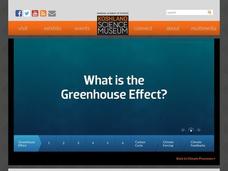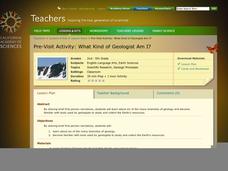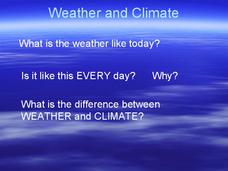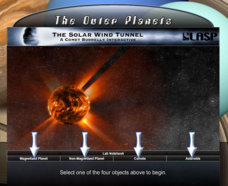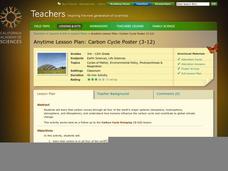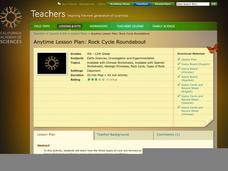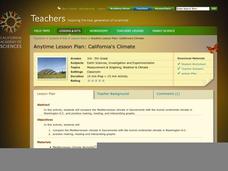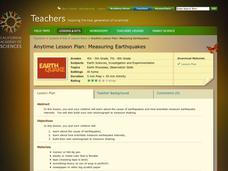California Academy of Science
Kinesthetic Astronomy: Earth's Rotation
After completing the activity, "Kinesthetic Astronomy: The Meaning of a Year," zoom in on Earth's rotation using the same simulation setup and this outline. Each class member dons a map of the Western Hemisphere and plays the part of...
National Academy of Sciences
What is the Greenhouse Effect?
The greenhouse effect warms up earth enough so it can support life, but if it heats up too much, life won't be able to survive. An interactive presentation covers the greenhouse effect, the carbon cycle, climate forcing, and climate...
California Academy of Science
What Kind of Geologist Am I?
Transform your class into young geologists as they learn about six different branches of geology. Using the included geology career descriptions and picture cards, learners work in small groups deciding which tools and locations fit...
Scholastic
Study Jams! A Day on Earth
It's good thing that it isn't up to RJ to spin the earth on its axis; he can't even keep a basketball spinning! In this video animation, he and viewers learn about Earth's movements in space. One thing to consider before you use this...
California Academy of Science
Kinesthetic Astronomy: The Meaning of a Year
How many times have you traveled around the sun? Aspiring astronomers grasp what a year is and they differentiate between orbit and rotation by walking around the sun right within your classroom. Place a lamp in the center of the room to...
California Academy of Science
Kinesthetic Astronomy: Longer Days, Shorter Nights
A lamp, four globes, and some signs taped around the room are all you need to set up a solar system simulation for teaching how Earth's tilted axis creates the seasons. (Sticky dots are also needed, but not mentioned in the materials...
California Academy of Science
Kinesthetic Astronomy: Birthday Stars
Space explorers take a virtual trip around the sun right within your classroom! They stand in a circle facing away from the "sun" (a lamp) in the center of the room. As they move according to your instructions, they view different...
California Academy of Science
Kinesthetic Astronomy: Moon Phases
We are the world! Each of your class members models Earth and holds a styrofoam ball to see its phases. Thorough teacher background information and a detailed lesson plan will make this a cinch to teach. If you do not want to purchase...
Curated OER
Weather and Climate
It's hot today, but is that the weather or the climate? This colorful presentation isolates both concepts to allow for better understanding by covering the positioning of the planet, making comparisons of land versus water, and looking...
California Academy of Science
Kinesthetic Astronomy: Mars Opposition Dance
Your class will watch as one child orbits the sun as Earth, while another orbits as Mars. If the timing is right, they will see the repetitive dance between the two planets and discover how often they are opposite from each other. For...
California Academy of Science
Human Evolution
As the great and hilarious Tim Minchin once said, "Science is simply the word we use to describe a method of organizing our curiosity." Science is more than just a guess; it is based on questions, observations, and evidence. High...
Howard Hughes Medical Institute
Winogradsky Columns: Microbial Ecology in the Classroom
Winogradsky columns are ideal for observing the role of bacteria and other microorganisms in an ecosystem. This student activity guide is complete with data tables for observations and analysis questions for processing what was observed....
Laboratory for Atmospheric and Space Physics
The Solar Wind Tunnel
The winds of change are blowing in our very own solar system! But what makes some heavenly bodies more affected by solar winds than others? Pupils discover the concept of magnetic forces at work in space in this...
101 Questions
Speed of Light
How quickly does light travel long distances? A short video simulates light going from the earth to the moon at two different paces. Scholars relate the distance to the rate to understand which simulation is correct.
Curated OER
Green Buildings Virtual Tour
Students fill out a worksheet after researching green buildings by taking a virtual tour. In this green buildings lesson plan, students use Google Earth to research green buildings.
California Academy of Science
Carbon Cycle Poster
Humans can have a big impact on the environment, specifically the influence they have on the carbon cycle. First, the class will define and discuss each of the earths four major spheres, the biosphere, hydrosphere, atmosphere, and...
California Academy of Science
Carbon Cycle Role Play
Anytime you make concepts clear with role playing or hands-on experience, it's a win for the whole class. Ping-Pong balls are used to represent carbon in a carbon cycle role-play activity. In small groups, children first discuss what...
California Academy of Science
Natural Resources Bingo
Bingo isn't just a silly game, it's a great way to practice all types of skills. After reviewing that the earth is composed of natural resources, what those natural resources are, and sustainability, the class plays a game of bingo. The...
Space Awareness
Star in a Box
What happens to stars as they get older? A simulation takes pupils through the life cycle of stars based on their masses. The resource introduces the Hertzsprung-Russell diagram and the common relationships and life cycle patterns observed.
California Academy of Science
Rock Cycle Roundabout
After a basic introduction to the rock cycle and the three main types of rocks, young geologists can deepen their understanding of how rocks change through a fun learning game. Based on the characteristics and events shared by a reader,...
California Academy of Science
Discovering Rainforest Locations
How many rainforests are there, where are they, and do global factors effect their locations? These are great questions that have great answers. Children in grades four through eight use several different maps to determine why...
California Academy of Science
California's Climate
The United States is a large country with many different climates. Graph and analyze temperature and rainfall data for Sacramento and Washington DC as you teach your class about the characteristics of Mediterranean climates. Discuss the...
California Academy of Science
Measuring Earthquakes
After a brief discussion on earthquakes, make a makeshift seismograph to record the shaking of the table that it sits upon. While the background information will be useful to you as a teacher, the seismograph does not seem like it would...

